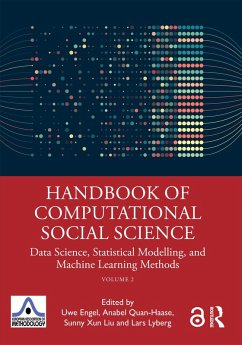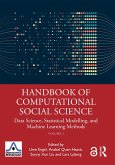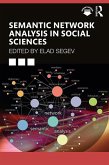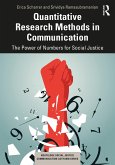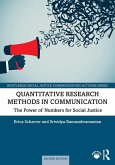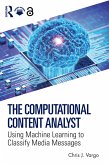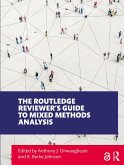Handbook of Computational Social Science, Volume 2 (eBook, ePUB)
Data Science, Statistical Modelling, and Machine Learning Methods
Redaktion: Engel, Uwe; Lyberg, Lars; Liu, Sunny; Quan-Haase, Anabel
57,95 €
57,95 €
inkl. MwSt.
Sofort per Download lieferbar

29 °P sammeln
57,95 €
Als Download kaufen

57,95 €
inkl. MwSt.
Sofort per Download lieferbar

29 °P sammeln
Jetzt verschenken
Alle Infos zum eBook verschenken
57,95 €
inkl. MwSt.
Sofort per Download lieferbar
Alle Infos zum eBook verschenken

29 °P sammeln
Handbook of Computational Social Science, Volume 2 (eBook, ePUB)
Data Science, Statistical Modelling, and Machine Learning Methods
Redaktion: Engel, Uwe; Lyberg, Lars; Liu, Sunny; Quan-Haase, Anabel
- Format: ePub
- Merkliste
- Auf die Merkliste
- Bewerten Bewerten
- Teilen
- Produkt teilen
- Produkterinnerung
- Produkterinnerung

Bitte loggen Sie sich zunächst in Ihr Kundenkonto ein oder registrieren Sie sich bei
bücher.de, um das eBook-Abo tolino select nutzen zu können.
Hier können Sie sich einloggen
Hier können Sie sich einloggen
Sie sind bereits eingeloggt. Klicken Sie auf 2. tolino select Abo, um fortzufahren.

Bitte loggen Sie sich zunächst in Ihr Kundenkonto ein oder registrieren Sie sich bei bücher.de, um das eBook-Abo tolino select nutzen zu können.
The Handbook of Computational Social Science is a comprehensive reference source for scholars across multiple disciplines. It outlines key debates in the field, showcasing novel statistical modeling and machine learning methods, and draws from specific case studies to demonstrate the opportunities and challenges in CSS approaches.
- Geräte: eReader
- mit Kopierschutz
- eBook Hilfe
Andere Kunden interessierten sich auch für
![Handbook of Computational Social Science, Volume 2 (eBook, PDF) Handbook of Computational Social Science, Volume 2 (eBook, PDF)]() Handbook of Computational Social Science, Volume 2 (eBook, PDF)57,95 €
Handbook of Computational Social Science, Volume 2 (eBook, PDF)57,95 €![Semantic Network Analysis in Social Sciences (eBook, ePUB) Semantic Network Analysis in Social Sciences (eBook, ePUB)]() Semantic Network Analysis in Social Sciences (eBook, ePUB)48,95 €
Semantic Network Analysis in Social Sciences (eBook, ePUB)48,95 €![Quantitative Research Methods in Communication (eBook, ePUB) Quantitative Research Methods in Communication (eBook, ePUB)]() Erica ScharrerQuantitative Research Methods in Communication (eBook, ePUB)50,95 €
Erica ScharrerQuantitative Research Methods in Communication (eBook, ePUB)50,95 €![Quantitative Research Methods in Communication (eBook, ePUB) Quantitative Research Methods in Communication (eBook, ePUB)]() Erica ScharrerQuantitative Research Methods in Communication (eBook, ePUB)67,95 €
Erica ScharrerQuantitative Research Methods in Communication (eBook, ePUB)67,95 €![The Computational Content Analyst (eBook, ePUB) The Computational Content Analyst (eBook, ePUB)]() Chris J. VargoThe Computational Content Analyst (eBook, ePUB)0,00 €
Chris J. VargoThe Computational Content Analyst (eBook, ePUB)0,00 €![Computational Social Science (eBook, ePUB) Computational Social Science (eBook, ePUB)]() Computational Social Science (eBook, ePUB)54,95 €
Computational Social Science (eBook, ePUB)54,95 €![The Routledge Reviewer's Guide to Mixed Methods Analysis (eBook, ePUB) The Routledge Reviewer's Guide to Mixed Methods Analysis (eBook, ePUB)]() The Routledge Reviewer's Guide to Mixed Methods Analysis (eBook, ePUB)64,95 €
The Routledge Reviewer's Guide to Mixed Methods Analysis (eBook, ePUB)64,95 €-
-
-
The Handbook of Computational Social Science is a comprehensive reference source for scholars across multiple disciplines. It outlines key debates in the field, showcasing novel statistical modeling and machine learning methods, and draws from specific case studies to demonstrate the opportunities and challenges in CSS approaches.
Hinweis: Dieser Artikel kann nur an eine deutsche Lieferadresse ausgeliefert werden.
Dieser Download kann aus rechtlichen Gründen nur mit Rechnungsadresse in A, B, BG, CY, CZ, D, DK, EW, E, FIN, F, GR, HR, H, IRL, I, LT, L, LR, M, NL, PL, P, R, S, SLO, SK ausgeliefert werden.
Hinweis: Dieser Artikel kann nur an eine deutsche Lieferadresse ausgeliefert werden.
Produktdetails
- Produktdetails
- Verlag: Taylor & Francis eBooks
- Seitenzahl: 434
- Erscheinungstermin: 10. November 2021
- Englisch
- ISBN-13: 9781000448627
- Artikelnr.: 62906278
- Verlag: Taylor & Francis eBooks
- Seitenzahl: 434
- Erscheinungstermin: 10. November 2021
- Englisch
- ISBN-13: 9781000448627
- Artikelnr.: 62906278
- Herstellerkennzeichnung Die Herstellerinformationen sind derzeit nicht verfügbar.
Uwe Engel is Professor at the University of Bremen, Germany, where he held a chair in sociology from 2000 to 2020. From 2008 to 2013, Dr. Engel coordinated the Priority Programme on "Survey Methodology" of the German Research Foundation. His current research focuses on data science, human-robot interaction, and opinion dynamics. Anabel Quan-Haase is Professor of Sociology and Information and Media Studies at Western University and Director of the SocioDigital Media Lab, London, Canada. Her research interests include social media, social networks, life course, social capital, computational social science, and digital inequality/inclusion. Sunny Xun Liu is a research scientist at Stanford Social Media Lab, USA. Her research focuses on the social and psychological effects of social media and AI, social media and well-being, and how the design of social robots impact psychological perceptions. Lars Lyberg was Head of the Research and Development Department at Statistics Sweden and Professor at Stockholm University. He was an elected member of the International Statistical Institute. In 2018, he received the AAPOR Award for Exceptionally Distinguished Achievement.
Preface
Dominic Nyhuis, Tobias Ringwald, Oliver Rittmann, Thomas Gschwend and Rainer Stiefelhagen
- Introduction to the Handbook of Computational Social Science
- A Brief History of APIs: Limitations and Opportunities for Online Research
- Application Programming Interfaces and Web Data For Social Research
- Web Data Mining: Collecting Textual Data from Web Pages Using R
- Analyzing Data Streams for Social Scientists
- Handling Missing Data in Large Data Bases
A Primer on Probabilistic Record Linkage- Reproducibility and Principled Data Processing
- Applying a Total Error Framework for Digital Traces to Social Media Research
- Crowdsourcing in Observational and Experimental Research
- Inference from Probability and Nonprobability Samples
- Challenges of Online Non-Probability Surveys
- Large-scale Agent-based Simulation and Crowd Sensing with Mobile Agents
- Agent-based Modelling for Cultural Networks: Tagging by Artificial Intelligent Cultural Agents
- Using Subgroup Discovery and Latent Growth Curve Modeling to Identify Unusual Developmental Trajectories
- Disaggregation via Gaussian Regression for Robust Analysis of Heterogeneous Data
- Machine Learning Methods for Computational Social Science
- Principal Component Analysis
- Unsupervised Methods: Clustering Methods
- Text Mining and Topic Modeling
- From Frequency Counts to Contextualized Word Embeddings: The Saussurean Turn in Automatic Content Analysis
- Automated Video Analysis for Social Science Research
Uwe Engel, Anabel Quan-Haase, Sunny Xun Liu and Lars Lyberg
Section I. Data in CSS: Collection, Management, and Cleaning
Jakob Jünger
Dominic Nyhuis
Stefan Bosse, Lena Dahlhaus and Uwe Engel
Lianne Ippel, Maurits Kaptein and Jeroen Vermunt
Martin Spiess and Thomas Augustin
Ted Enamorado
John McLevey, Pierson Browne and Tyler Crick
Section II. Data Quality in CSS Research
Indira Sen, Fabian Flöck, Katrin Weller, Bernd Weiß and Claudia Wagner
Camilla Zallot, Gabriele Paolacci, Jesse Chandler and Itay Sisso
Rebecca Andridge and Richard Valliant
Jelke Bethlehem
Section III. Statistical Modelling and Simulation
Stefan Bosse
Fernando Sancho-Caparrini and Juan Luis Suárez
Axel Mayer, Christoph Kiefer, Benedikt Langenberg and Florian Lemmerich
Nazanin Alipourfard, Keith Burghardt and Kristina Lerman
Section IV: Machine Learning Methods
Richard D. De Veaux and Adam Eck
Andreas Pöge and Jost Reinecke
Johann Bacher, Andreas Pöge and Knut Wenzig
Raphael H. Heiberger and Sebastian Munoz-Najar Galvez
Gregor Wiedemann and Cornelia Fedtke
Dominic Nyhuis, Tobias Ringwald, Oliver Rittmann, Thomas Gschwend and Rainer Stiefelhagen
Preface
Dominic Nyhuis, Tobias Ringwald, Oliver Rittmann, Thomas Gschwend and Rainer Stiefelhagen
- Introduction to the Handbook of Computational Social Science
- A Brief History of APIs: Limitations and Opportunities for Online Research
- Application Programming Interfaces and Web Data For Social Research
- Web Data Mining: Collecting Textual Data from Web Pages Using R
- Analyzing Data Streams for Social Scientists
- Handling Missing Data in Large Data Bases
A Primer on Probabilistic Record Linkage- Reproducibility and Principled Data Processing
- Applying a Total Error Framework for Digital Traces to Social Media Research
- Crowdsourcing in Observational and Experimental Research
- Inference from Probability and Nonprobability Samples
- Challenges of Online Non-Probability Surveys
- Large-scale Agent-based Simulation and Crowd Sensing with Mobile Agents
- Agent-based Modelling for Cultural Networks: Tagging by Artificial Intelligent Cultural Agents
- Using Subgroup Discovery and Latent Growth Curve Modeling to Identify Unusual Developmental Trajectories
- Disaggregation via Gaussian Regression for Robust Analysis of Heterogeneous Data
- Machine Learning Methods for Computational Social Science
- Principal Component Analysis
- Unsupervised Methods: Clustering Methods
- Text Mining and Topic Modeling
- From Frequency Counts to Contextualized Word Embeddings: The Saussurean Turn in Automatic Content Analysis
- Automated Video Analysis for Social Science Research
Uwe Engel, Anabel Quan-Haase, Sunny Xun Liu and Lars Lyberg
Section I. Data in CSS: Collection, Management, and Cleaning
Jakob Jünger
Dominic Nyhuis
Stefan Bosse, Lena Dahlhaus and Uwe Engel
Lianne Ippel, Maurits Kaptein and Jeroen Vermunt
Martin Spiess and Thomas Augustin
Ted Enamorado
John McLevey, Pierson Browne and Tyler Crick
Section II. Data Quality in CSS Research
Indira Sen, Fabian Flöck, Katrin Weller, Bernd Weiß and Claudia Wagner
Camilla Zallot, Gabriele Paolacci, Jesse Chandler and Itay Sisso
Rebecca Andridge and Richard Valliant
Jelke Bethlehem
Section III. Statistical Modelling and Simulation
Stefan Bosse
Fernando Sancho-Caparrini and Juan Luis Suárez
Axel Mayer, Christoph Kiefer, Benedikt Langenberg and Florian Lemmerich
Nazanin Alipourfard, Keith Burghardt and Kristina Lerman
Section IV: Machine Learning Methods
Richard D. De Veaux and Adam Eck
Andreas Pöge and Jost Reinecke
Johann Bacher, Andreas Pöge and Knut Wenzig
Raphael H. Heiberger and Sebastian Munoz-Najar Galvez
Gregor Wiedemann and Cornelia Fedtke
Dominic Nyhuis, Tobias Ringwald, Oliver Rittmann, Thomas Gschwend and Rainer Stiefelhagen
